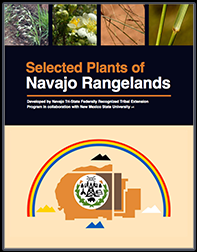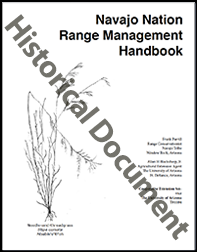Selected Plants of Navajo Rangelands
Download for Offline Use

Selected Plants of Navajo Rangelands (2018)
Developed by Navajo Tri-State Federally Recognized Tribal Extension Program in collaboration with New Mexico State University
This book can help agricultural professionals, ranchers, and others on the Navajo Nation to identify typical range plants and maximize rangeland ecology, productivity, and sustainability. Once downloaded to a device, it can be used even in areas without mobile or Wi-Fi coverage. Plants are arranged by Plant Type. Use the Index to find plants sorted by Common Name, Scientific Name, Habitat, Growing Season, Flower Color, or Livestock Special Considerations. Also includes the Navajo names of the plants.
Recommendations for use
On a mobile device
Android:
Open the PDF in either the "PDF Viewer" app or the "Moon+ Reader" app or open the ePub in the "Lithium: EPUB Reader" app.
iOS:
Open the ePub in the iBooks app.
Tablets & other devices:
Try opening the ePub or PDF in your favorite ebook reader. If that doesn't work, try one of the solutions above.
On a computer
Mac:
Open the ePub in the iBooks reader or the PDF in Adobe Acrobat Reader.
PC or other computer:
Open the PDF in Adobe Acrobat Reader.




Navajo Nation Range Management (1981)
Published by Cooperative Extension Service, The University of Arizona.
This historical document, written by Frank Parrill and Allan H. Blacksheep, Jr. and published by the University of Arizona in 1981, explains how rangeland – the vegetation, soil, and water – has played an important part in the history, the culture and the life of Navajo People.
©2018 NMSU Board of Regents.
Individual photographers retain all rights to their images.
Partially funded by the
Western Sustainable
Agriculture Research and Education Program
(westernsare.org; 435.797.2257),
project EW15-023.
Programs and projects supported by Western SARE are
equally open to all people.
 ePub Download
ePub Download
 PDF Download
PDF Download